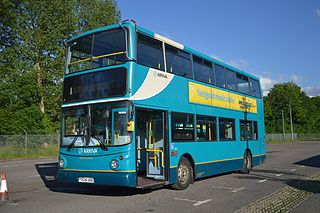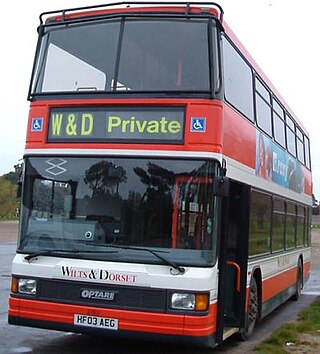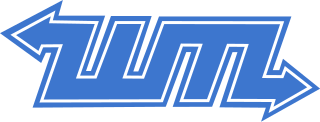
The MCW Metrobus is a two and three-axle double-decker bus manufactured by Metro Cammell Weymann (MCW) between 1977 and 1989, with over 4,000 built. The original MkI was superseded by the MkII which had a symmetrical windscreen with an arched top in 1981, although production of the original MkI continued for the Greater Manchester Passenger Transport Executive and London Regional Transport until 1983 and 1985 respectively. The Metrobus was conceived as an integral product manufactured completely by MCW, but Alexander and Northern Counties also bodied some examples.

Metroline is a bus company operating services in Greater London and south Hertfordshire. It is a subsidiary of ComfortDelGro Corporation of Singapore, It also operates bus services under contract to Transport for London. As at March 2021, the fleet consisted of 1,532 buses, making it the third largest London Buses operator. Operations are split between two registered companies, Metroline Travel Limited and Metroline West Limited.

The VDL DB250 was a twin-axle double-decker bus chassis manufactured by VDL Bus & Coach.

The Optare Spectra was a double-decker bus body built on the DAF DB250 chassis between 1991 and 2006.

The Optare Excel was a low-floor full-size single-decker bus manufactured by Optare. Manufactured as an integral bus, the Excel was launched in 1995 as one of the first low floor single-deck vehicles, replacing the step-entrance Optare Sigma. The styling of the body was in keeping with existing Optare products. At the front, a simple flat panel with the Optare name was set between two pairs of twin headlamps, below a very large front windscreen. Approximately 600 were built.

The Leyland Lynx was a stepped-entrance single-decker bus manufactured by Leyland in Workington, England between 1986 and 1992. After the takeover by Volvo, it was succeeded by the Volvo B10B.

The Volvo B10L was a rear-engined, low-floor single-decker public bus chassis built by Volvo between c. 1993 and c. 2005. An articulated version of the B10L, known as the B10LA, was also produced.

South Yorkshire Transport (SYT) was a bus operator that provided services around South Yorkshire and outlying areas. The company was formed as an 'arms-length' successor of the South Yorkshire Passenger Transport Executive (SYPTE) in 1986, which was broken up as a result of the deregulation of bus services. South Yorkshire Transport operated buses in and around Doncaster, Rotherham and Sheffield with some services extending to Chesterfield, Leeds and Barnsley.

The Daimler Fleetline is a rear-engined double-decker bus chassis which was built between 1960 and 1983.

The Northern Counties Palatine was a step-entrance 2-axle and 3-axle double-decker bus body built by Northern Counties from 1988 to 1999 in Wigan, England.

GM Buses was the main bus company serving the ten metropolitan districts of Greater Manchester in North West England. The company was formed in 1986 by the Greater Manchester Passenger Transport Executive. In December 1993, it was split into GM Buses North and GM Buses South in order to increase competition for services in the area, before they were sold to the FirstGroup and Stagecoach respectively.

Stagecoach East is the divisional name for the bus operations of the Stagecoach Group in eastern England.

Capital Citybus was a bus operator in London operating services under contract to London Regional Transport.
The Passenger Transport Executive (PTE) bus operations were the bus operating divisions of the passenger transport executives in the United Kingdom. In 1986 they underwent a process of deregulation and privatisation, forming some of the largest private bus companies in the UK outside London, with all being sold to their employees or management. Despite their relative size and lucrative operating areas, none of the companies survived beyond the late 1990s, with all falling into the hands of the major bus groups, who had their origins in privatised regional subsidiaries of the former National Bus Company and the Scottish Bus Group.
Travel Your Bus was a bus operator in the West Midlands. It was a subsidiary of West Midlands Travel.

The privatisation of London bus services was the process of the transfer of operation of buses in London from public bodies to private companies.

United Counties Omnibus was an English bus company, operating in Northamptonshire, Bedfordshire, and parts of surrounding counties.

London Country North East was a bus operator in South East England and London. It was formed from the split of London Country Bus Services in 1986 and operated a fleet of around 350 buses from six garages, with its headquarters located in Hatfield.

The West Midlands Passenger Transport Executive (WMPTE) was the public body responsible for public transport in the West Midlands metropolitan county in the United Kingdom from 1969 until 2016. The organisation operated under the name Centro from 1990, and was publicly branded as Network West Midlands from 2005.

The Alexander Ultra was a low floor single-deck bus body built on the Volvo B10L chassis by Walter Alexander Coachbuilders from 1995 to 1998. It was the right-hand drive equivalent of the Volvo 5000 and was built on license from Volvo Buses.






















